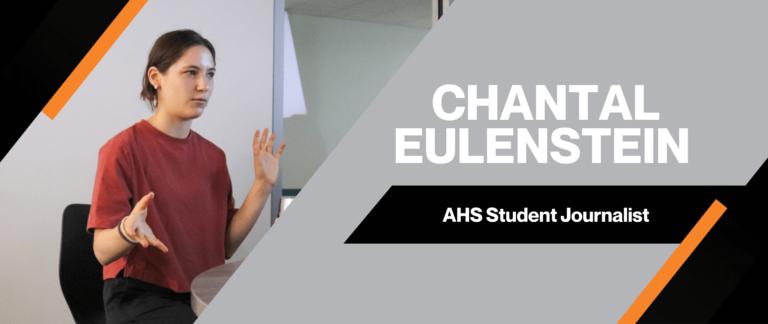

AHS Student Wins Editorial Contest
In a world where social media reigns supreme and information is condensed into bite-sized pieces, the role of student journalism might appear diminished. However, for Chantal Eulenstein, Editor-in-Chief of The WEB, student journalism is not just relevant; it’s vital. Eulenstein shares her journey, experiences with The WEB, and her passionate plea for the revival of student journalism.
In June, Eulenstein’s editorial appeared in the New York Times’ Giving Up on Student Journalism Means Giving Up on Student Voices. Her essay is one of the 11 winners of The Learning Network’s 10th Annual Student Editorial Contest, for which 12,592 entries were received.
“I’ve been submitting to the New York Times editorial competition for the past four years, and each year the competition asks students the same questions to inspire their editorial – ‘What makes you mad? What would you like to see change?’ This year, the answer to those questions always reverted back to a frustration that I’ve felt towards the lack of attention and funding that has been given to student journalists, despite the importance of our work,” Eulenstein said.
The challenges faced by The WEB, including a small staff, lack of funding, and waning student interest, spurred her to action. She recognized that this was not an isolated issue limited to her school but a nationwide crisis. Eulenstein’s determination to shine a spotlight on the struggles of student journalism led to her compelling essay.
For Eulenstein, The WEB has been a profound learning experience. She’s not only gained knowledge through hands-on work but has also been mentored by experienced editors. She emphasizes how her Editor-in-Chief from the previous year played a crucial role in shaping her journalism skills.
The paper’s long history, dating back to 1928, adds to the gravitas of student journalism.
“It’s strange sometimes to think that the paper has been around for nearly 100 years, and a little disheartening to see the decline in student journalism that has occurred in a century. The WEB’s age is a responsibility, but one that remains as motivation and hope,” Eulenstein reflects.
In an era characterized by information overload and the prevalence of short-form content, student journalism takes on a renewed significance.
Eulenstein explains, “Today, in a world where our generation is reading and engaging with news at a rate less than any generation before, student journalism is vital because it ensures that journalism survives.”
With social media platforms dominating the news landscape, the risk of misinformation due to the absence of accurate context is greater than ever. Student journalists, according to Eulenstein, are the guardians of accurate storytelling.
Without these guardians of truth, there would be no New York Times, no Washington Post, no Associated Press, or even small town Iowa newspapers such as The News-Review in Sigourney.
As Editor-in-Chief of The WEB, Eulenstein has ambitious goals. She wants to expand the paper’s reach, engage more students, and refocus on local stories. Her journalism-oriented career goals extend beyond high school; she envisions herself pursuing journalism in college and aspires to work for prominent national newspapers like The New York Times.
Ultimately, Eulenstein’s passion for storytelling transcends the workplace or institution.
“Journalism is what I have decided on as a career path and what I would like to focus on in college. It’s always been a dream of mine to work for a large national newspaper like The New York Times, but as I’ve grown a little older, it’s become more clear that what it comes down to is telling stories. Working for The New York Times or not, journalism degree or not, I know I’ll always want to tell stories,” she said.
When she isn’t focusing on her leadership in the newsroom or focusing on the AP Stylebook, Eulenstein has another way to keep her mind on point, fencing.
“A lot of winning has to do with intimidating your opponent, feigning attacks, and waiting to strike when they’ve made a mistake,” Eulenstein said. “Not to say that journalism tactics have anything to do with intimidation and attacking, but the multitasking that goes on in your mind is very similar. When you’re conducting an interview, the bottom line is that you have to listen, but at the same time you also have to keep in mind what questions you want to ask to best tell the interviewee’s story and how you want to ask those questions to best guide the interview.”